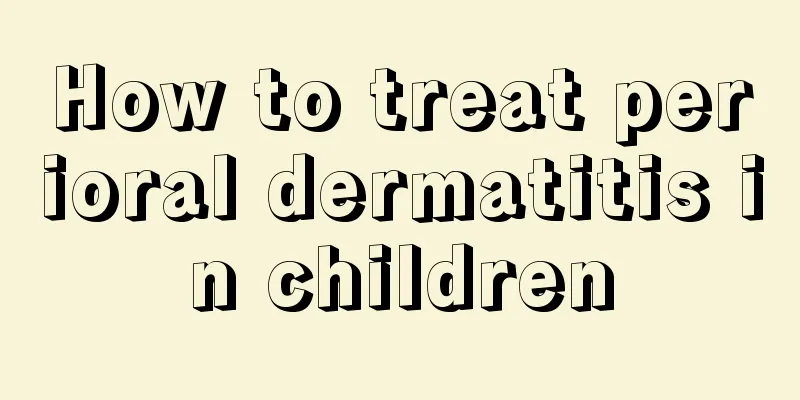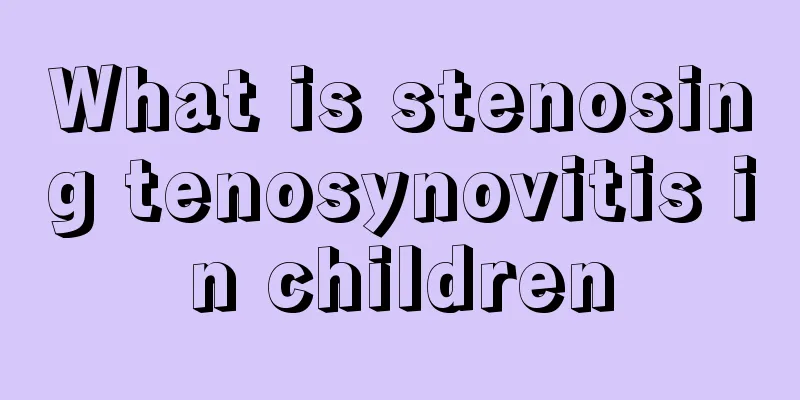How to treat perioral dermatitis in children

|
Perioral dermatitis is a relatively common disease in children. Children have relatively poor immunity and are prone to perioral dermatitis in their daily lives. This type of acne often appears on the lips, nasolabial grooves, nose and other parts. It is mainly a skin disease caused by papular erythema and scales. When a child develops this disease, he or she must receive regular treatment in a timely manner, which can be achieved through oral medication or topical application of medication. How to treat perioral dermatitis in children Gradually reduce and eventually stop the use of corticosteroids, and use topical moisturizers such as silicone cream and VitE cream. Perioral dermatitis, commonly known as mouth sores, is the name of a disease in Western medicine. Symptoms include redness and itching of the skin around the mouth, with rice-sized papules appearing on the affected area, either sparsely scattered or clustered in patches. Over time, blisters and pustules may appear on the papules. They are yellow-white in color, surrounded by red halos, and feel burning. If there is a temporary recovery and the symptoms are alleviated, small scales will appear, shaped like chaff, and will fall off if touched. Traditional Chinese medicine believes that this disease is caused by overeating of fatty and sweet foods, which leads to accumulation of dampness and heat in the spleen and stomach, which turns into fire over time and causes the fumigation of fire evil. So how to prevent and treat mouth sores? First of all, personal prevention is very important. Avoid spicy, greasy, and alcoholic foods, and avoid external application of fluorinated corticosteroid emulsions. If comprehensive treatment is carried out on this basis, such as internal medication therapy, external medication therapy, and single prescription therapy, it can have unexpected results. The following is a brief description of its comprehensive treatment: 1. Internal treatment: Decoction: regulate the spleen and stomach, clear away heat and remove dampness. Medicinal use: Scutellaria baicalensis 10g, Coptis chinensis 6g, Magnolia officinalis 10g, Atractylodes lancea 10g, Tangerine peel 10g, Liuyi powder 12g (wrapped and decocted), Forsythia suspensa 12g. Take it in decoction, 1 dose per day. (II) External treatment: ① Apply 5% sulfur cream externally once in the morning and evening; ② Apply silicone cream externally once in the morning and evening. 3. Prescription: 10g of Coptis chinensis, 5g of Lithospermum officinale, 100ml of sesame oil. Simmer until dry and remove the residue. Use the remaining oil for external application. Precautions 1. Avoid scratching. Scratching can cause the skin to be constantly exposed to mechanical stimulation, causing it to become thicker and even cause infection. Scratching also has a reinforcing effect. The more the patient scratches, the more itchy it becomes, and the more itchy it becomes, the more he scratches, forming a vicious cycle and prolonging the course of the disease. 2. Avoid washing with hot water. In the acute stage of dermatitis and eczema, due to the expansion of capillaries in the skin, there will be varying degrees of skin redness, swelling, papules, and blisters. Washing or soaking with hot water will increase the redness and swelling, increase the amount of exudate, and worsen the condition. Therefore, patients with dermatitis and eczema should take a warm shower and avoid soaking in hot water or rubbing hard. 3. Avoid washing with soap, especially alkaline soap, which is a chemical irritant to the skin and can aggravate dermatitis and eczema. If you need to use soap to remove stains, it is best to choose boric acid soap with less irritation. 4. Avoid irritating foods. Irritating foods such as peppers, alcohol, strong tea, coffee, etc. can aggravate itching and easily make eczema worse or relapse, so they should be avoided. |
>>: Can myopia among middle school students be cured?
Recommend
What's wrong with a 6-year-old child having a fever and diarrhea?
A six-year-old child is already a child and can n...
Causes of fever and dizziness in children
Many parents will face this problem that their ch...
What to do if your child has rhinitis and nasal congestion? Mom has a solution
Rhinitis is very common in children. Many babies ...
Children's teeth are uneven
Children need to replace their teeth at certain s...
What is the problem of newborn drooling frequently?
In the process of caring for newborns, parents sh...
Will applying ginger powder on the soles of the baby's feet hurt the baby's body?
Applying minced ginger to the soles of the feet i...
Can a one-year-old baby eat kelp?
There are many things to pay attention to when it...
What should I do if my child is anxious about going to kindergarten?
Most parents will encounter a big problem, that i...
Reasons why children sweat at night
If children always sweat easily when sleeping at ...
What to do with lymph nodes on baby's head
Some parents may find that the lymph nodes on the...
Water temperature for preparing milk powder for newborn
It is not easy to make milk powder for babies, bu...
What are the symptoms of protein allergy in children?
Young children's immunity is not yet fully de...
What should I do if my toddler has recurring diarrhea?
Diarrhea in young children can be divided into mi...
Symptoms and treatment of sinusitis in children
Sinusitis in children is a very common nasal dise...
What is the best age to learn Taekwondo?
Nowadays, Taekwondo is not a skill that only boys...









